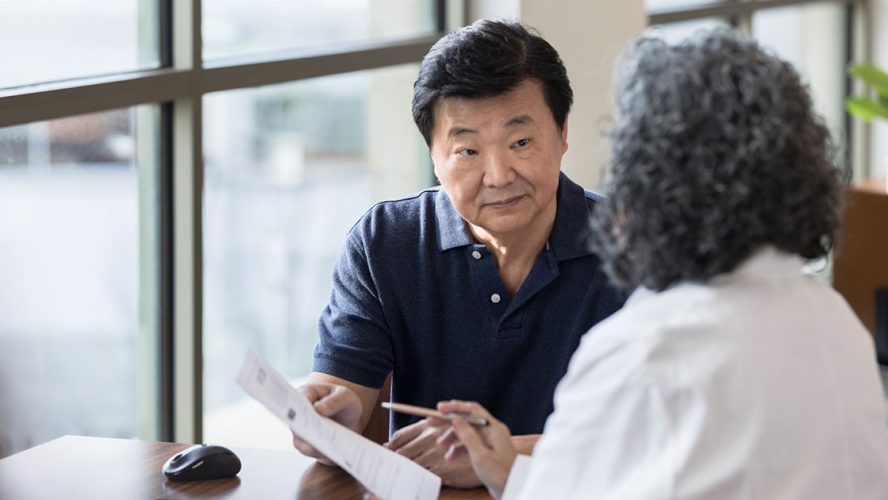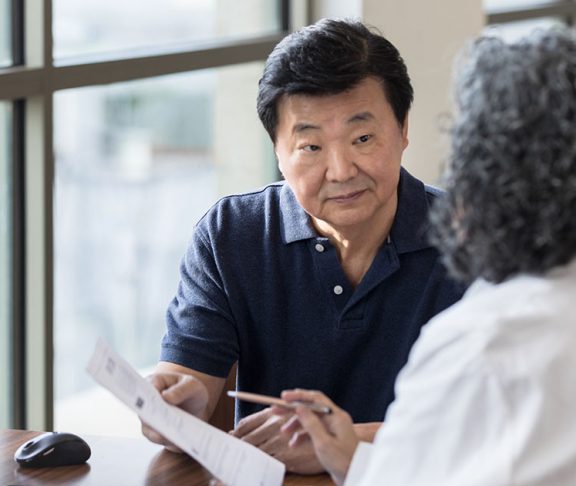Earlier detection of kidney cancer and advances in treatment have led to improved remission and cure rates. But if kidney cancer patients have chronic kidney disease (CKD), then their long-term outcomes may not be as good as for those without CKD.
This is because CKD can increase the risk for heart problems, kidney failure, and death. In fact, an estimated one-third of the 300,000 kidney cancer survivors in the United States either had CKD before treatment or will develop it during or after treatment. Therefore, a person living with an early-stage kidney tumor is much more likely to die of problems related to CKD than to problems related to cancer.
What is chronic kidney disease?
CKD means that your kidneys have not been working as well as they should for at least three months. The two main causes of adult CKD in the United States are diabetes and high blood pressure. Other major risk factors for developing CKD include heart disease, having a family member with a history of CKD, and obesity.
In CKD, the kidneys are damaged, but there are usually no symptoms until it is very far advanced. Having CKD puts you at greater risk for a heart attack, stroke, or kidney failure. When the kidneys fail, you need dialysis or a transplant to stay alive.
Kidney cancer treatment
When tumors must be removed with surgery, an important goal is to preserve as much kidney function as possible. If the possible, the surgeon will usually perform a partial nephrectomy, in which only the part of the kidney with a tumor is removed, rather than a radical nephrectomy, in which the entire kidney is removed.
But sometimes a radical nephrectomy cannot be avoided, especially if the tumor is large or if the tumor is located in the center of the kidney. A partial nephrectomy is also called nephron-sparing surgery. This is because each kidney has about one million tiny filters called nephrons that continually remove wastes from your blood. Fewer nephrons means having a greater chance of developing CKD. So the more nephrons you have left after surgery, the better.
Advancements in treatment
The exciting advance in recent years for people living with kidney cancer is that many kidney cancers can be cured with surgery. Even in cases in which kidney cancer may not be curable, chemotherapy drugs given before surgery can shrink tumors so that more of the kidney can be spared during surgery or the possibility for cure can be increased.
Chemotherapy drugs that travel throughout the body, including the kidneys, are used in advanced kidney cancer to slow or stop cancer from spreading. Some of these drugs are toxic to the kidneys and cause kidney damage. Other drugs may cause problems that increase risk for CKD, such as high blood pressure.
Therefore, your doctor will follow your kidney function very closely during treatment. Your doctor may decrease the dose of a cancer drug, stop it, or switch to another drug. Clinicians should also make sure that problems such as high blood pressure and diabetes are well-controlled and that other drugs are given in doses that do as little harm to the kidneys as possible.
Kidney protection
Kidney protection during kidney cancer treatment includes:
- Testing for CKD before the start of cancer treatment, including surgery
- Preventing or limiting kidney damage
- Keeping kidneys healthy after treatment
- If possible, using treatment options that will better preserve kidney function
- Treating CKD before, during, and after treatment.
How to protect your kidneys
- Get tested for CKD. CKD is diagnosed using two simple tests. Both these tests must be done to have a clear picture of your kidney health.
- The estimated glomerular filtration rate (eGFR) is a blood test that measures how well the kidneys are removing wastes from the blood.
- The urine albumin-creatinine ratio (uACR) measures the amount of protein called albumin in the urine. When the kidneys leak too much albumin, you may have kidney damage that can lead to CKD. You must be checked for CKD before, during, and after treatment for kidney cancer.
- Ask your doctor and healthcare team about your kidney health and how often your kidneys will be checked during treatment.
- Control blood pressure and control blood sugar if you have diabetes.
- Avoid non-steroidal anti-inflammatory drugs (NSAIDS) such as ibuprofen and naproxen.
- Do not smoke.
- Do physical activity and follow a healthy diet.
- Tell your doctor and health care team about all drugs and supplements you take.
- Ask you doctor if it is possible to use treatments that will cause less harm to your kidneys.
- If you have CKD, make sure you are following all treatments as ordered by your doctor and healthcare team.

